Organizational Theory and Behavior: CEO Pay Ethics Report
VerifiedAdded on 2020/12/18
|7
|1117
|195
Report
AI Summary
This report delves into the realm of organizational behavior, specifically examining the ethics of CEO compensation in comparison to other employees. It explores whether the practice of high CEO salaries is ethically sound, considering factors like responsibility, risk, and legal mandates. The report analyzes reward distribution systems, emphasizing the role of financial incentives in motivating employees and the importance of fair wages. It also addresses the impact of leadership, ethical considerations, and employee stress within the context of organizational structure. The conclusion reinforces the need for a balanced approach to compensation and the implementation of reward systems to boost employee morale and contribution to the company's success. References include journals and books that support the arguments presented.
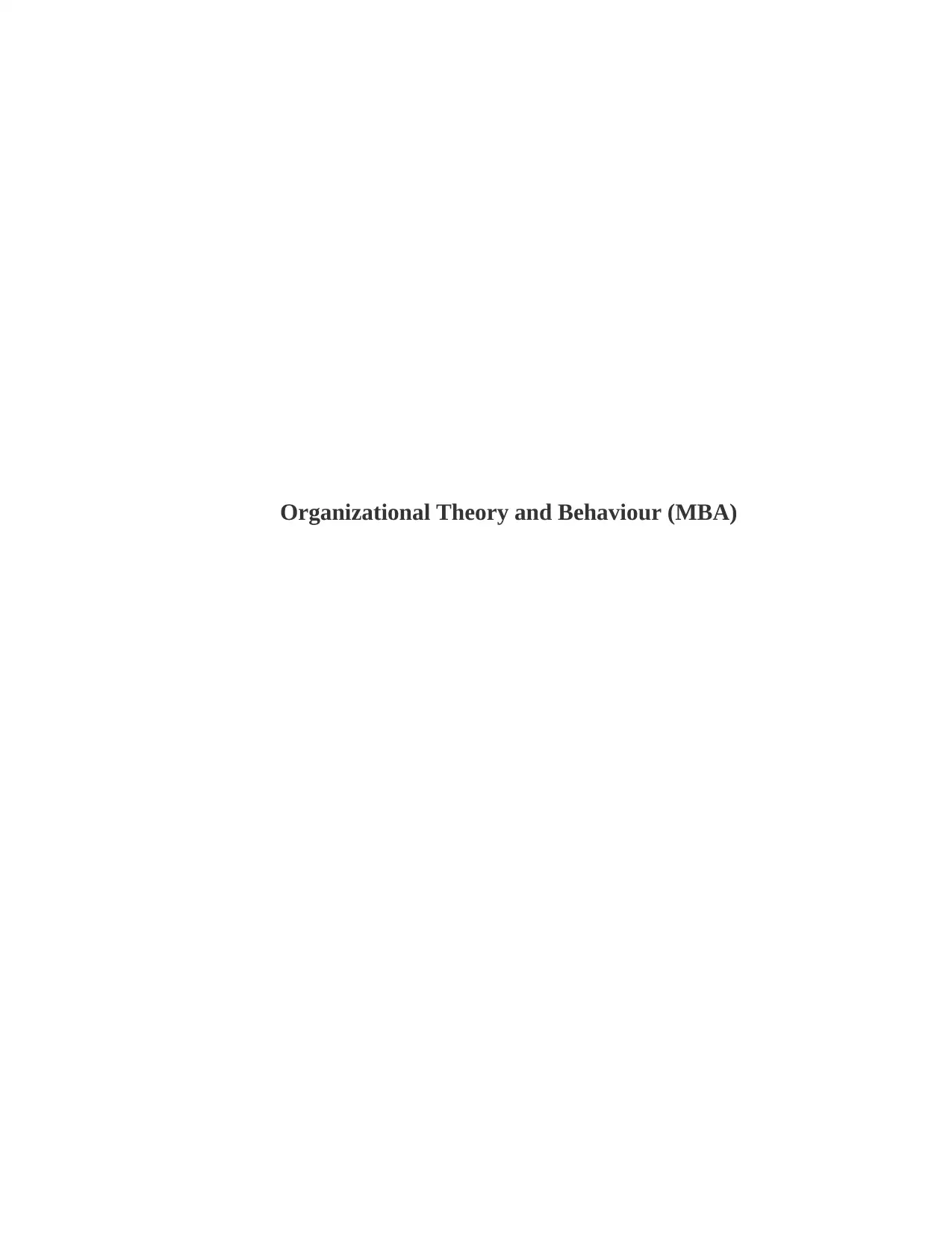
Organizational Theory and Behaviour (MBA)
Paraphrase This Document
Need a fresh take? Get an instant paraphrase of this document with our AI Paraphraser
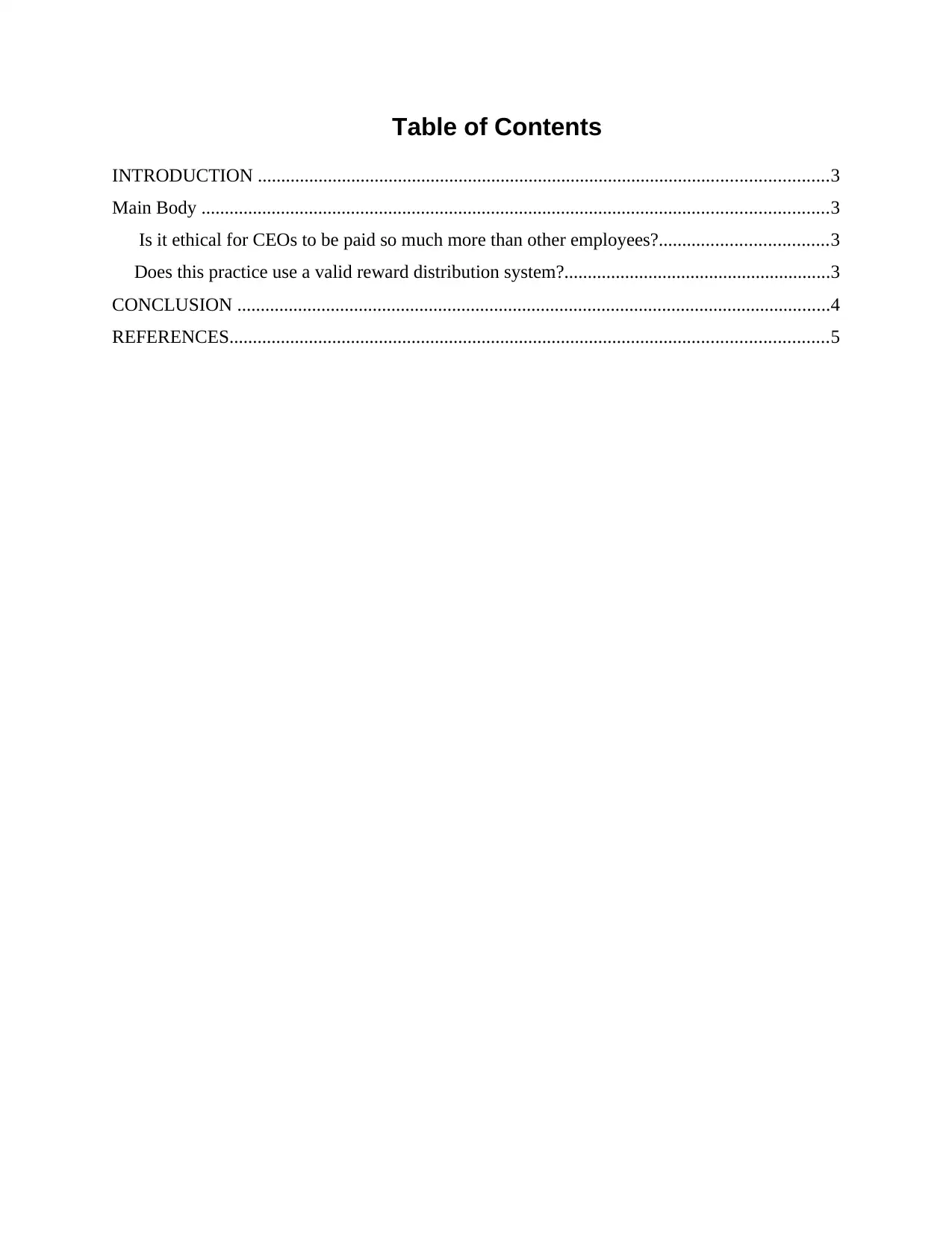
Table of Contents
INTRODUCTION ..........................................................................................................................3
Main Body ......................................................................................................................................3
Is it ethical for CEOs to be paid so much more than other employees?....................................3
Does this practice use a valid reward distribution system?.........................................................3
CONCLUSION ...............................................................................................................................4
REFERENCES................................................................................................................................5
INTRODUCTION ..........................................................................................................................3
Main Body ......................................................................................................................................3
Is it ethical for CEOs to be paid so much more than other employees?....................................3
Does this practice use a valid reward distribution system?.........................................................3
CONCLUSION ...............................................................................................................................4
REFERENCES................................................................................................................................5
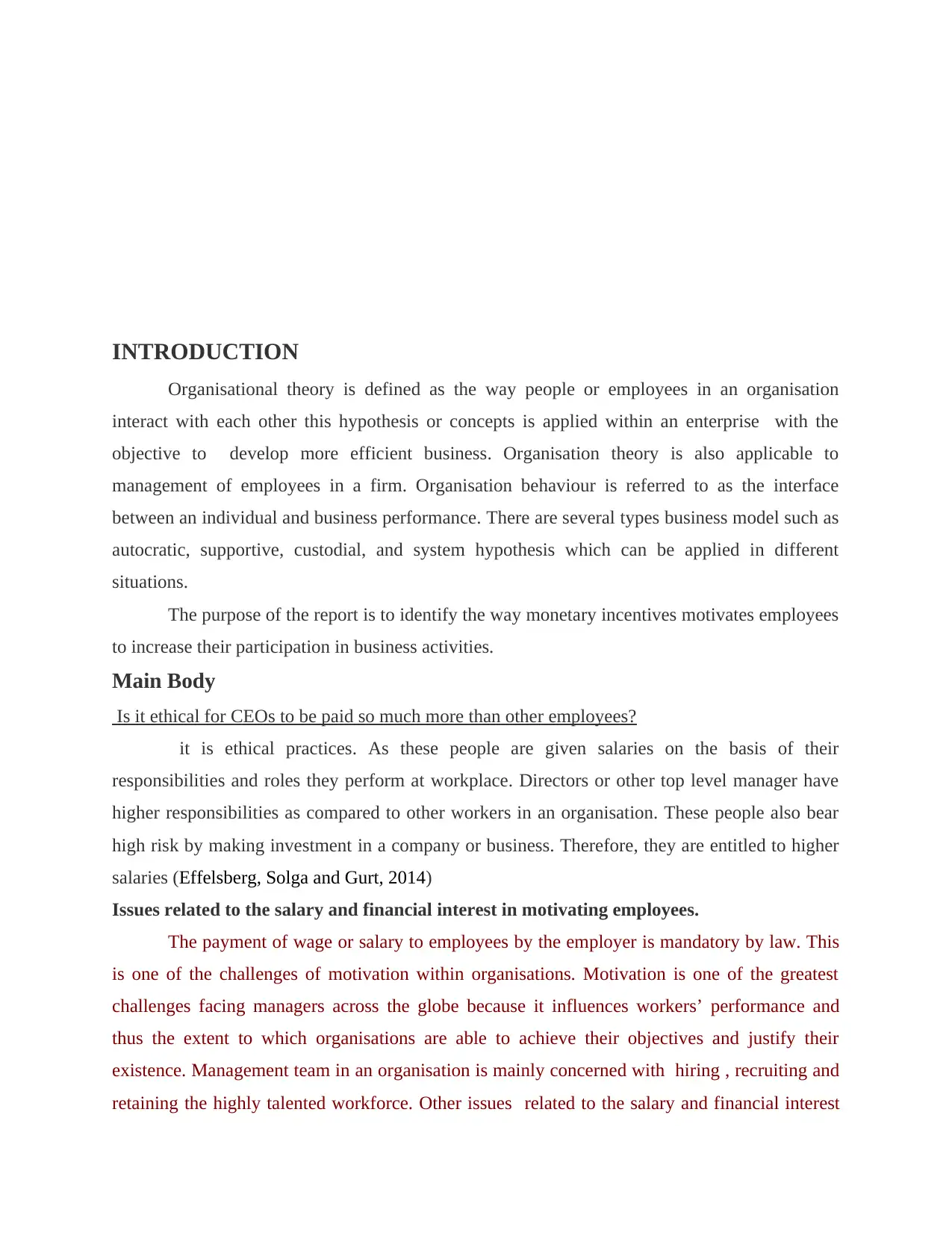
INTRODUCTION
Organisational theory is defined as the way people or employees in an organisation
interact with each other this hypothesis or concepts is applied within an enterprise with the
objective to develop more efficient business. Organisation theory is also applicable to
management of employees in a firm. Organisation behaviour is referred to as the interface
between an individual and business performance. There are several types business model such as
autocratic, supportive, custodial, and system hypothesis which can be applied in different
situations.
The purpose of the report is to identify the way monetary incentives motivates employees
to increase their participation in business activities.
Main Body
Is it ethical for CEOs to be paid so much more than other employees?
it is ethical practices. As these people are given salaries on the basis of their
responsibilities and roles they perform at workplace. Directors or other top level manager have
higher responsibilities as compared to other workers in an organisation. These people also bear
high risk by making investment in a company or business. Therefore, they are entitled to higher
salaries (Effelsberg, Solga and Gurt, 2014)
Issues related to the salary and financial interest in motivating employees.
The payment of wage or salary to employees by the employer is mandatory by law. This
is one of the challenges of motivation within organisations. Motivation is one of the greatest
challenges facing managers across the globe because it influences workers’ performance and
thus the extent to which organisations are able to achieve their objectives and justify their
existence. Management team in an organisation is mainly concerned with hiring , recruiting and
retaining the highly talented workforce. Other issues related to the salary and financial interest
Organisational theory is defined as the way people or employees in an organisation
interact with each other this hypothesis or concepts is applied within an enterprise with the
objective to develop more efficient business. Organisation theory is also applicable to
management of employees in a firm. Organisation behaviour is referred to as the interface
between an individual and business performance. There are several types business model such as
autocratic, supportive, custodial, and system hypothesis which can be applied in different
situations.
The purpose of the report is to identify the way monetary incentives motivates employees
to increase their participation in business activities.
Main Body
Is it ethical for CEOs to be paid so much more than other employees?
it is ethical practices. As these people are given salaries on the basis of their
responsibilities and roles they perform at workplace. Directors or other top level manager have
higher responsibilities as compared to other workers in an organisation. These people also bear
high risk by making investment in a company or business. Therefore, they are entitled to higher
salaries (Effelsberg, Solga and Gurt, 2014)
Issues related to the salary and financial interest in motivating employees.
The payment of wage or salary to employees by the employer is mandatory by law. This
is one of the challenges of motivation within organisations. Motivation is one of the greatest
challenges facing managers across the globe because it influences workers’ performance and
thus the extent to which organisations are able to achieve their objectives and justify their
existence. Management team in an organisation is mainly concerned with hiring , recruiting and
retaining the highly talented workforce. Other issues related to the salary and financial interest
⊘ This is a preview!⊘
Do you want full access?
Subscribe today to unlock all pages.

Trusted by 1+ million students worldwide
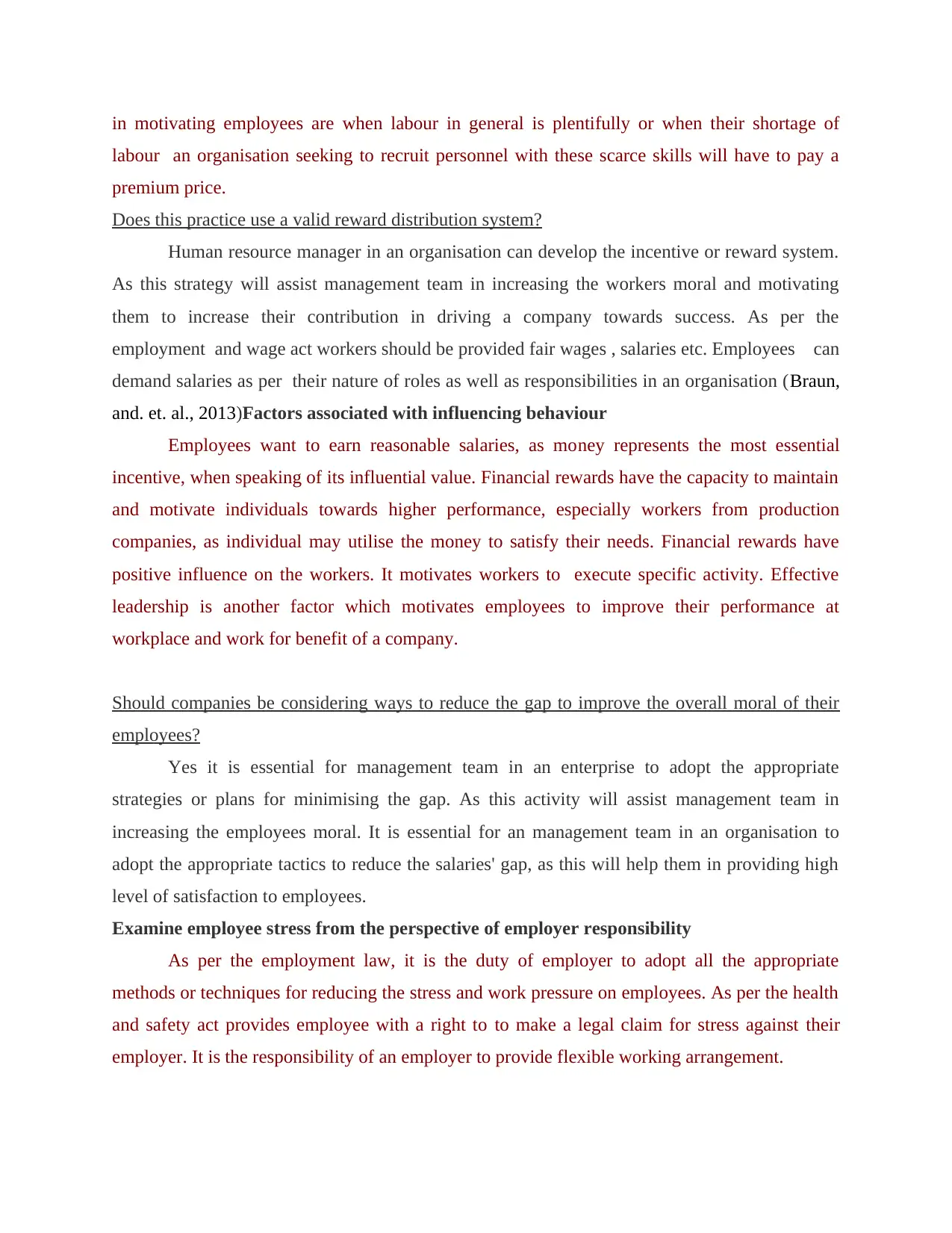
in motivating employees are when labour in general is plentifully or when their shortage of
labour an organisation seeking to recruit personnel with these scarce skills will have to pay a
premium price.
Does this practice use a valid reward distribution system?
Human resource manager in an organisation can develop the incentive or reward system.
As this strategy will assist management team in increasing the workers moral and motivating
them to increase their contribution in driving a company towards success. As per the
employment and wage act workers should be provided fair wages , salaries etc. Employees can
demand salaries as per their nature of roles as well as responsibilities in an organisation (Braun,
and. et. al., 2013)Factors associated with influencing behaviour
Employees want to earn reasonable salaries, as money represents the most essential
incentive, when speaking of its influential value. Financial rewards have the capacity to maintain
and motivate individuals towards higher performance, especially workers from production
companies, as individual may utilise the money to satisfy their needs. Financial rewards have
positive influence on the workers. It motivates workers to execute specific activity. Effective
leadership is another factor which motivates employees to improve their performance at
workplace and work for benefit of a company.
Should companies be considering ways to reduce the gap to improve the overall moral of their
employees?
Yes it is essential for management team in an enterprise to adopt the appropriate
strategies or plans for minimising the gap. As this activity will assist management team in
increasing the employees moral. It is essential for an management team in an organisation to
adopt the appropriate tactics to reduce the salaries' gap, as this will help them in providing high
level of satisfaction to employees.
Examine employee stress from the perspective of employer responsibility
As per the employment law, it is the duty of employer to adopt all the appropriate
methods or techniques for reducing the stress and work pressure on employees. As per the health
and safety act provides employee with a right to to make a legal claim for stress against their
employer. It is the responsibility of an employer to provide flexible working arrangement.
labour an organisation seeking to recruit personnel with these scarce skills will have to pay a
premium price.
Does this practice use a valid reward distribution system?
Human resource manager in an organisation can develop the incentive or reward system.
As this strategy will assist management team in increasing the workers moral and motivating
them to increase their contribution in driving a company towards success. As per the
employment and wage act workers should be provided fair wages , salaries etc. Employees can
demand salaries as per their nature of roles as well as responsibilities in an organisation (Braun,
and. et. al., 2013)Factors associated with influencing behaviour
Employees want to earn reasonable salaries, as money represents the most essential
incentive, when speaking of its influential value. Financial rewards have the capacity to maintain
and motivate individuals towards higher performance, especially workers from production
companies, as individual may utilise the money to satisfy their needs. Financial rewards have
positive influence on the workers. It motivates workers to execute specific activity. Effective
leadership is another factor which motivates employees to improve their performance at
workplace and work for benefit of a company.
Should companies be considering ways to reduce the gap to improve the overall moral of their
employees?
Yes it is essential for management team in an enterprise to adopt the appropriate
strategies or plans for minimising the gap. As this activity will assist management team in
increasing the employees moral. It is essential for an management team in an organisation to
adopt the appropriate tactics to reduce the salaries' gap, as this will help them in providing high
level of satisfaction to employees.
Examine employee stress from the perspective of employer responsibility
As per the employment law, it is the duty of employer to adopt all the appropriate
methods or techniques for reducing the stress and work pressure on employees. As per the health
and safety act provides employee with a right to to make a legal claim for stress against their
employer. It is the responsibility of an employer to provide flexible working arrangement.
Paraphrase This Document
Need a fresh take? Get an instant paraphrase of this document with our AI Paraphraser
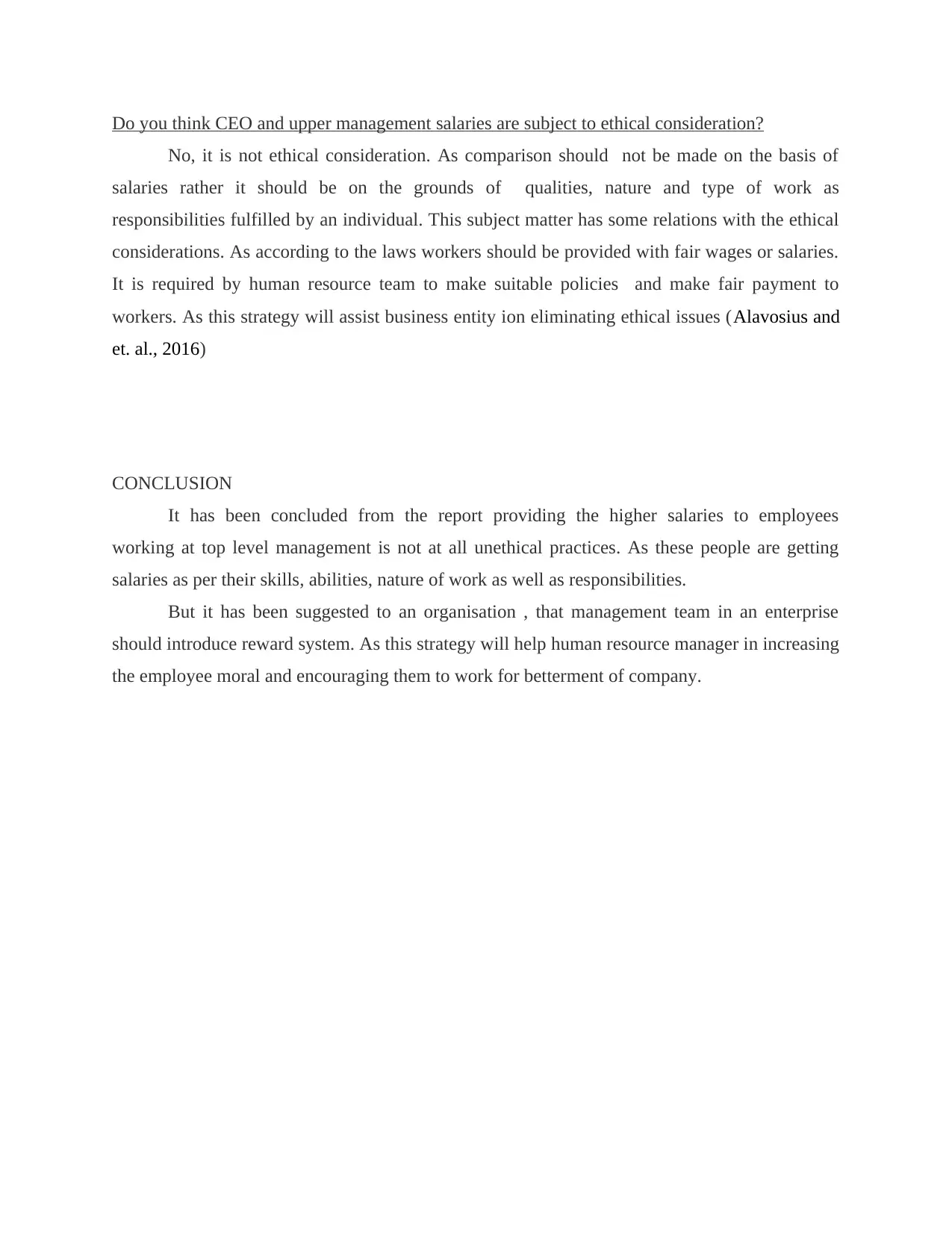
Do you think CEO and upper management salaries are subject to ethical consideration?
No, it is not ethical consideration. As comparison should not be made on the basis of
salaries rather it should be on the grounds of qualities, nature and type of work as
responsibilities fulfilled by an individual. This subject matter has some relations with the ethical
considerations. As according to the laws workers should be provided with fair wages or salaries.
It is required by human resource team to make suitable policies and make fair payment to
workers. As this strategy will assist business entity ion eliminating ethical issues (Alavosius and
et. al., 2016)
CONCLUSION
It has been concluded from the report providing the higher salaries to employees
working at top level management is not at all unethical practices. As these people are getting
salaries as per their skills, abilities, nature of work as well as responsibilities.
But it has been suggested to an organisation , that management team in an enterprise
should introduce reward system. As this strategy will help human resource manager in increasing
the employee moral and encouraging them to work for betterment of company.
No, it is not ethical consideration. As comparison should not be made on the basis of
salaries rather it should be on the grounds of qualities, nature and type of work as
responsibilities fulfilled by an individual. This subject matter has some relations with the ethical
considerations. As according to the laws workers should be provided with fair wages or salaries.
It is required by human resource team to make suitable policies and make fair payment to
workers. As this strategy will assist business entity ion eliminating ethical issues (Alavosius and
et. al., 2016)
CONCLUSION
It has been concluded from the report providing the higher salaries to employees
working at top level management is not at all unethical practices. As these people are getting
salaries as per their skills, abilities, nature of work as well as responsibilities.
But it has been suggested to an organisation , that management team in an enterprise
should introduce reward system. As this strategy will help human resource manager in increasing
the employee moral and encouraging them to work for betterment of company.
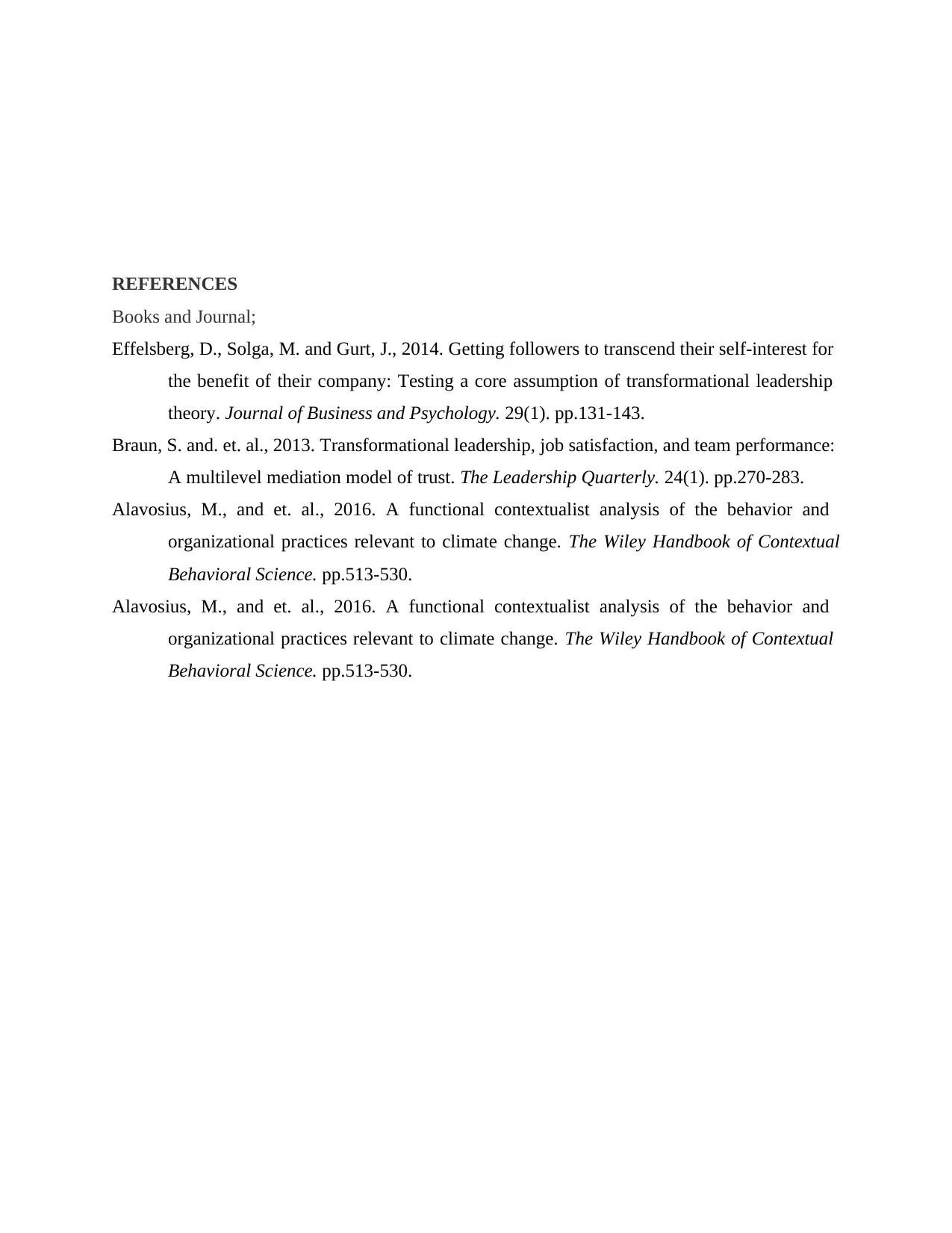
REFERENCES
Books and Journal;
Effelsberg, D., Solga, M. and Gurt, J., 2014. Getting followers to transcend their self-interest for
the benefit of their company: Testing a core assumption of transformational leadership
theory. Journal of Business and Psychology. 29(1). pp.131-143.
Braun, S. and. et. al., 2013. Transformational leadership, job satisfaction, and team performance:
A multilevel mediation model of trust. The Leadership Quarterly. 24(1). pp.270-283.
Alavosius, M., and et. al., 2016. A functional contextualist analysis of the behavior and
organizational practices relevant to climate change. The Wiley Handbook of Contextual
Behavioral Science. pp.513-530.
Alavosius, M., and et. al., 2016. A functional contextualist analysis of the behavior and
organizational practices relevant to climate change. The Wiley Handbook of Contextual
Behavioral Science. pp.513-530.
Books and Journal;
Effelsberg, D., Solga, M. and Gurt, J., 2014. Getting followers to transcend their self-interest for
the benefit of their company: Testing a core assumption of transformational leadership
theory. Journal of Business and Psychology. 29(1). pp.131-143.
Braun, S. and. et. al., 2013. Transformational leadership, job satisfaction, and team performance:
A multilevel mediation model of trust. The Leadership Quarterly. 24(1). pp.270-283.
Alavosius, M., and et. al., 2016. A functional contextualist analysis of the behavior and
organizational practices relevant to climate change. The Wiley Handbook of Contextual
Behavioral Science. pp.513-530.
Alavosius, M., and et. al., 2016. A functional contextualist analysis of the behavior and
organizational practices relevant to climate change. The Wiley Handbook of Contextual
Behavioral Science. pp.513-530.
⊘ This is a preview!⊘
Do you want full access?
Subscribe today to unlock all pages.

Trusted by 1+ million students worldwide

1 out of 7
Related Documents
Your All-in-One AI-Powered Toolkit for Academic Success.
+13062052269
info@desklib.com
Available 24*7 on WhatsApp / Email
![[object Object]](/_next/static/media/star-bottom.7253800d.svg)
Unlock your academic potential
Copyright © 2020–2026 A2Z Services. All Rights Reserved. Developed and managed by ZUCOL.




